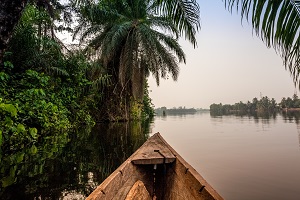
On 22 June 2020, Ghana became the 3rd African country (44th Party) to accede to the Convention on the Protection and Use of Transboundary Watercourses and International Lakes (Water Convention), serviced by UNECE, and the 37th Party to the Convention on the Law of the Non-Navigational Uses of International Watercourses (Watercourses Convention).
Ghana’s transboundary river basins, namely the Volta River basin (shared with Benin, Burkina Faso, Côte d’Ivoire, Mali and Togo – home to over 23 million people, with a population projected to more than double by 2050), Bia and Tano Rivers (shared with Côte d’Ivoire) and Todzie-Aka basin (shared with Togo), cover over 75% of the country’s land surface and generate around 80% of freshwater flow.
These shared water resources provide water for drinking, sanitation, agriculture (which accounts for between 54 and 85% of employment in Volta basin countries), hydropower, and industrial needs. The basins link the populations across borders, creating socioeconomic interdependencies between the riparian countries.
Transboundary cooperation in these shared basins is therefore critical to ensure sustainable development and preserve regional stability, especially in the context of rising water stress linked to climate change; and to ensure access to safe water and sanitation, which is vital for hygiene in the face of COVID-19.
Her Excellency, Ms Cecilia Abena Dapaah, Minister for Sanitation and Water Resources stated that “Ghana promotes transboundary cooperation as a key means to ensure pragmatic solutions anchored on negotiations and dialogue with her riparian neighbours. The growing effects of climate change and pressure on water resources call for urgent action to deepen existing cooperation. Ghana encourages the other riparian countries also to accede to both key global Conventions (1992 Water Convention and 1997 Watercourses Convention) in order to strengthen our international cooperation and national measures for the sound utilization, management and development of transboundary surface waters and groundwater resources”.
UNECE Executive Secretary Ms Olga Algayerova said “I warmly congratulate Ghana on its accession to the two global water conventions. This important step signals the mounting political momentum for water cooperation in Africa, harnessing the two United Nations Water Conventions, as a foundation for sustainable development, conflict prevention, and climate change adaptation. UNECE will continue its collaboration with countries, regional and sub-regional organizations to promote and implement the two global Water Conventions. I call on all UN Member States sharing water resources to join and make full use of these instruments”.
An increasing number of countries are seizing the institutional and legal frameworks of the global Water Conventions to facilitate concrete efforts for cooperation on shared water resources. Ghana’s accession to the Water Convention follows that of Chad and Senegal in 2018, which became the first countries outside the pan-European region to join. Côte d’Ivoire and Togo – with which Ghana shares its basins –, Cameroon and the Central African Republic, are in advanced stages of the national accession process to the Convention, while numerous other African nations are among the around 20 countries worldwide taking steps towards joining.
Ghana’s accession to the two Conventions, supported by UNECE, Green Cross International, WWF and others since 2018, also follows the recommendation of the Council of Ministers of the Volta Basin Authority made at its 7th session held in Accra (Ghana) on 10 May 2019. This also shows the important role played by regional organizations, notably basin organizations, in the promotion of the Global Water Conventions.
Ghana's accession to the Water Convention will enter into force within the next 90 days (20 September 2020).
Note to editors
About the Water Convention
The Convention on the Protection and Use of Transboundary Watercourses and International Lakes, the secretariat of which is provided by UNECE, has, since its entry into force in 1996, provides an important framework for improving the management of transboundary surface water and groundwater resources in the pan-European region. In March 2016, the Water Convention became a global multilateral and intergovernmental legal framework for transboundary water cooperation, open for accession to all UN Member States.
The Convention aims to protect and ensure the qualitative, quantitative and sustainable management of transboundary water resources by facilitating and promoting cooperation between countries. An important aspect of the Convention is its institutional framework, which is based on the Meeting of the Parties, its subsidiary bodies, such as working groups and task forces, as well as a permanent secretariat. This framework assists Parties in the implementation and progressive development of the Convention, which includes the exchange of experiences and good practices, the development of guidelines and recommendations, field projects and capacity-building. The Convention works on various areas, such as adaptation to climate change and the connection between water, food, energy and ecosystems within transboundary basins.
Transboundary cooperation under the Water Convention can accelerate progress towards the Sustainable Development Goals (SDGs), particularly towards SDG target 6.5 to "implement integrated water resources management at all levels, including through transboundary cooperation". UNECE is, together with UNESCO, the custodian agency for indicator SDG 6.5.2, which measures cooperation on transboundary waters.

